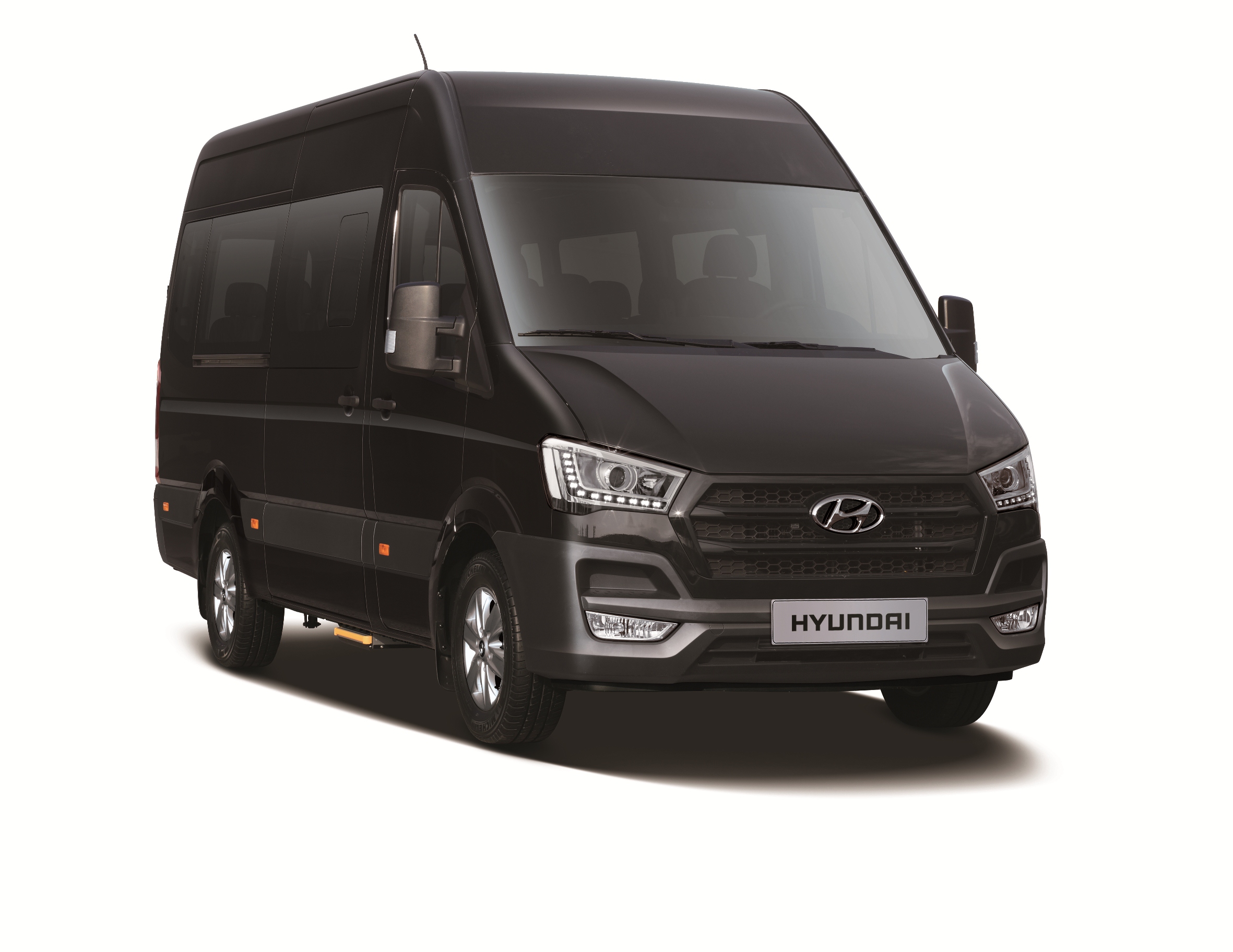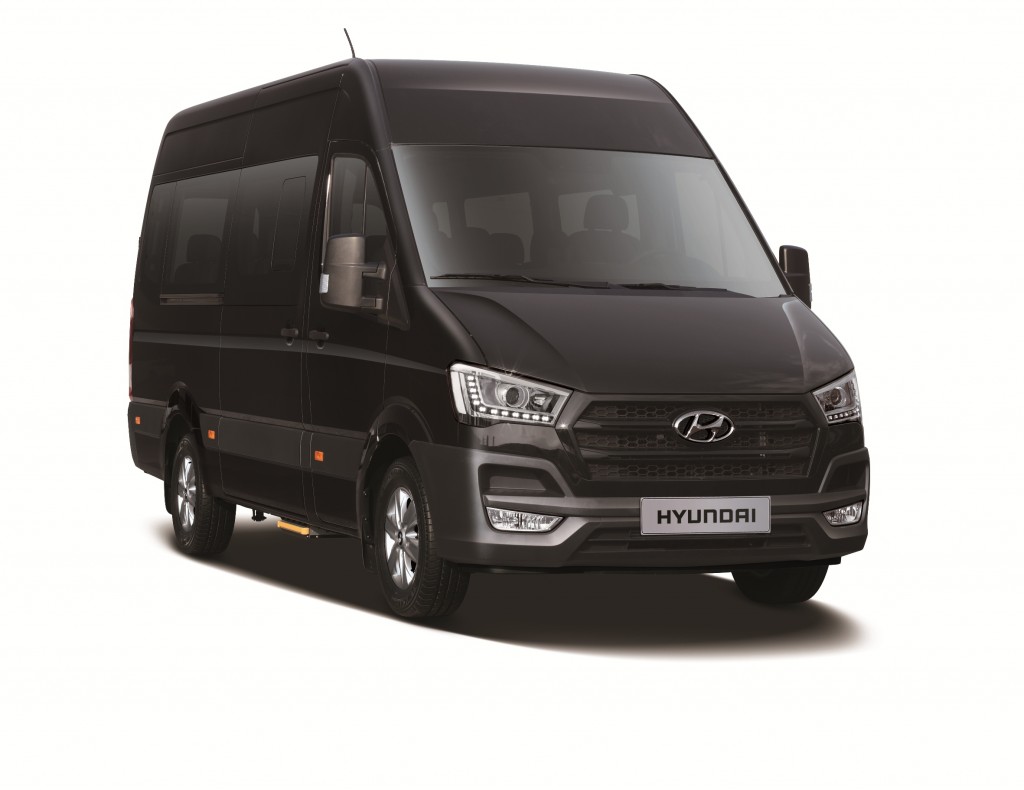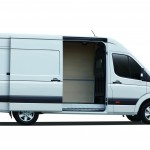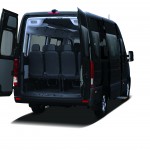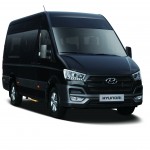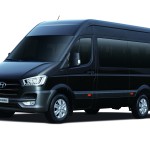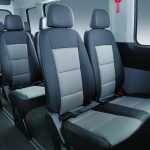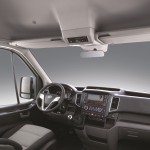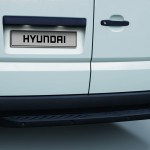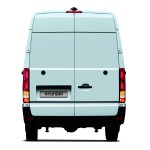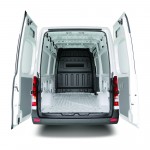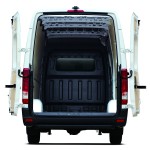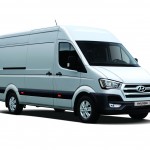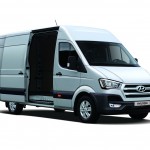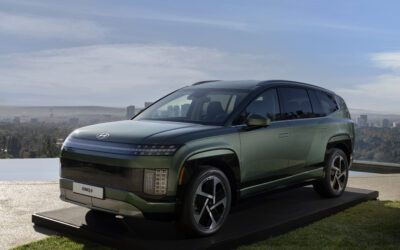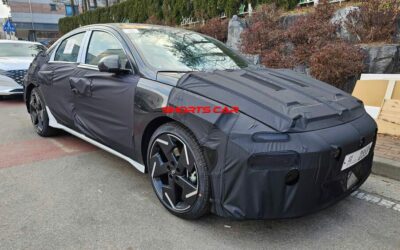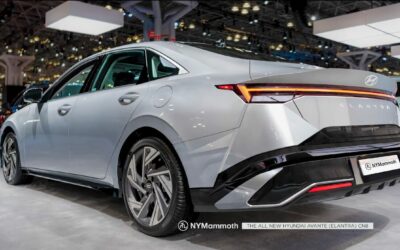Hyundai today revealed the H350 and H350 passenger bus, its first light commercial vehicle (LCV) designed specifically for the European market. An efficient, safe and stylish vehicle, the H350 provides a versatile, practical and convenient option for commercial vehicle users.
[ads id=”4″ style=”float:left;padding:9px;”]H350 is set on a flexible platform that can support three body styles, cargo van, passenger bus and flatbed truck – strengthening the company’s European vehicle line-up, entering the light commercial vehicle segment and targeting new customers in Europe.
Hyundai’s LCV engineers focused on six key areas during the development of H350; efficiency, value, loading capacity, safety, reliability and performance. H350 was benchmarked against its major rivals from the major premium European commercial vehicle manufacturers, ensuring the user experience compared favorably with vehicles in its sector.
H350 furthers the modern Hyundai family aesthetic demonstrated by its passenger cars, featuring distinctive and aerodynamic design. Responsive yet predictable handling combines with a comfortable and stable ride, offering drivers car-like characteristics and high levels of refinement.
Use of advanced high-strength steel and advanced chassis engineering has enabled Hyundai to ensure H350 benefits from a strong bodyshell, complementing the sophisticated safety features to provide class-leading crashworthiness. Hyundai demonstrates the democratization of technologies from its passenger cars to its commercial vehicles with H350, offering premium levels of comfort and conveniences.
The H350 has been designed as a rugged and reliable work tool, yet it is stylish and refined enough to operate as a comfortable mode of personal transport for friends and family too. This breadth of capabilities ensures H350 delivers a rewarding ownership experience, giving business and private users the flexibility they need to succeed.
Powerful and efficient turbo diesel engines, matched to a 6-speed manual transmission, provide plentiful torque to ensure H350 is capable of carrying heavy cargo (up to 1.4 tonnes) in its load bay (3780 x 1795 x 1955 mm) with ease, while also offering the capacity to transport an additional 2.5 tonnes load thanks to its towing capability.
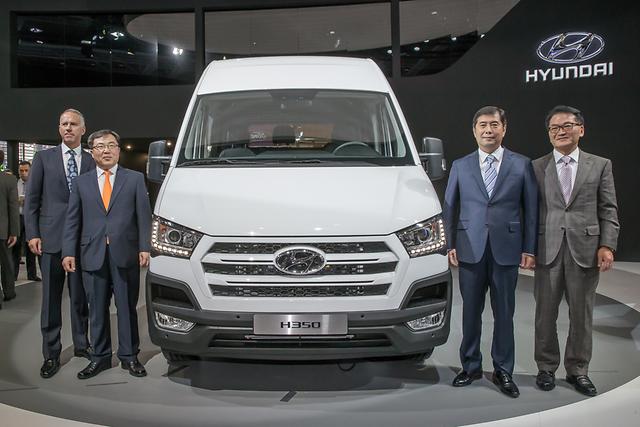
01 Key Facts: H350
Multi-purpose light commercial van for the global market
02 Styling
Modern design with Hyundai’s latest family aesthetic
03 Driving Performance
Comfortable ride, stable yet dynamic handling
04 Safety
High strength body shell, class-leading crashworthiness, sophisticated safety features
05 Convenience Features
Refined levels of driver and passenger comfort
06 NVH
Low levels of noise intrusion
07 Powertrain
Class-leading engine performance and optimized fuel efficiency
08 Technical Specifications
Full technical details of H350
* Product specifications and options available may vary by region
1. Key Facts: H350
- 3.5-tonne (GVW) cargo van with two/three seats
- 4.0 tonne Passenger Bus with 14/15 seats
- Modern design with Hyundai’s latest family aesthetic/li>
- Aerodynamic with low drag coefficient
- Multi-purpose, functional mobility concept
- Advanced convenience devices
- Spacious cabin with comfortable occupant head and leg room
- Ergonomic, driver-focused interior layout
- Superior cabin storage space can accommodate five standardized Euro pallets (1200 mm x 800 mm x 900 mm)
- Superior cargo area up to 12.9 ㎥
- Wide rear access with 180- and 270-degree access for ease of loading
- Wide sliding side door
- Load floor fitted with 14 cargo anchor points
- Class-leading engine performance
- Optimized fuel efficiency
- Comfortable ride, stable, dynamic handling
- Low levels of noise intrusion
- Reduced booming noise under acceleration, low vibration at idle
- High-strength bodyshell (75% advanced high-strength steel) , class-leading crashworthiness
- Sophisticated safety features including airbag system
- Vehicle Dynamic Control system
- Hydraulic Brake Assist
- Emergency Stop Signal
- Hill-Start Assist
- Roll Over Mitigation
- Lane Departure Warning System
- Use of 98% anti-corrosion steel
- Body-in-White electro coating for bodywork
- Cooling glove compartment
Hyundai’s modern family aesthetic has been applied to the exterior design of H350 to ensure it is consistent with the sophisticated styling of Hyundai’s current range of passenger cars. Despite the obvious aerodynamic disadvantages of LCVs when compared with passenger cars, H350 has been engineered with a low drag coefficient of 0.369.
Exterior Design
A hexagonal grille has been integrated into the front bumper of H350, similar in design to that of Hyundai’s most recent additions to its range of passenger cars. This front bumper design is both aesthetically pleasing and practical, as it incorporates a side step to enable easy cleaning of H350’s wind shield.
Stylish headlamps wrap around the front end of the new vehicle, and are available with optional projector lighting and LED Daytime Running Lights. Mirrors with integrated LED side repeaters improve visibility to other road users, while side marker-lamps with integrated reflectors improve visibility at night. Side moldings run down the flanks of H350, segmenting the cargo van’s panels and reducing the possibility of damage. A practical sliding side-door opens to a width of 1279 mm for quick and easy loading.
The rear of H350 focuses on practicality. Twin rear swing-doors (with optional glass panes) open to 180- and 270-degree angles, and when both are opened they combine to offer an entry width of 1538 mm. An energy-absorbing rear bumper can be adapted with an optional rear assist step to make rear cargo area entry easier. An optional tow device provides a potential towing capacity of 2.5 tonnes (braked), providing further load carrying ability. A sleek high-level stop lamp is fitted with LED illumination, requiring limited servicing.
Interior Design
The driver-focused cabin in the H350 stays true to Hyundai’s core design principles of safety, ease of use and simplicity.
The H350 cargo van offers a refined interior with best-in-class driver head (1414 mm) and leg room (1071 mm). A European bench seat design capable of accommodating two or three occupants features eight-way cushioning control together with optional suspension support and heating functions. A tilting telescopic steering wheel ensures drivers of H350 can easily find a comfortable driving position.
In passenger bus form, H350 provides competitive head and leg room for occupants, and is capable of seating up to 15 people dependent on the positioning of its access door, which can be located at the front or side of the vehicle. Unlike its competitors, the H350 Bus can be specified with an electric mid-door step, when activated this makes entering and exiting the vehicle easier. The H350 passenger bus offers class-leading interior length (3738 mm) and cargo space (540 mm), while retaining a long seat pitch (798 mm) ensuring superior levels of passenger comfort.
Switches, instrumentation and storage areas are within easy reach of H350’s driving seat. Extensive ergonomic testing has resulted in excellent all-round visibility to the front, side and rear (via exterior mirrors).
Practical storage spaces are offered throughout the cabin of the H350. These include an under-seat storage area (revealed by lifting the passenger seat bench), large door pockets, a central dashboard pocket (containing a 12-volt power outlet), and an upper central fascia well, which offers further small-item storage space. Under the dashboard, the central fascia offers a folding table, an ashtray alongside two cup holders, while a large-capacity glovebox is offered with an optional cooling function and locking mechanism.
H350 customized van
Highlighting H350’s versatile nature, the vehicle can be tailored by German company, Bott to suit the bespoke needs of tradespeople. Racking systems incorporated into the vehicle’s cargo area allow for the storage of items, added to H350 dependent on the user’s requirements. These storage devices can be used to keep tools and trade materials secure during transport, but also offers those retail and artisan users transporting fragile products piece of mind during travel.
HMI
Switch placement in the cabin of H350 has been ergonomically optimized for ease of use by the driver, and offers a modern, intuitive layout packed with convenience features. A multi-function steering wheel houses audio and multi-display controls to alter information shown on the dashboard display. Cruise control and telephone hands-free functions can also be controlled from the steering wheel.
Load space
Generous loading space in the LCV sector is vital, and in this respect the H350 Cargo van stands out thanks to superior cargo space (1955 mm height, 1795 mm width, 3780 mm length). The load space can accommodate an impressive five standardized Euro pallets (1200 mm x 800 mm x 900 mm), and the user can easily load and unload these due to H350’s superior cargo space height and width dimensions (12.9 square meters). Conveniently, the loading room between each wheel arch (1380 mm), does not compromise the usability of the cargo space.
A separating steel bulkhead is fitted as standard between the cargo area and the cabin, and it is possible to fit an optional window to allow for viewing of the payload from the cabin space. The floor of the load area is fitted with 14 cargo anchor points, enabling payloads to be attached to the H350’s chassis for maximum cargo stability. Towards the rear of the cargo space a 12-volt power outlet is fitted. Cargo area lamps, found above the side and rear doors, activate automatically (when the doors are opened) providing illumination in low-light conditions.
3. Driving performance
Engine performance was another key focus for H350 engineers, and as a result the new model considerably outperforms its class rivals in displacement, maximum power and maximum torque. The 2.5-liter power unit is available in both standard power (110 kW / 373 Nm) and high power (125 kW / 422 Nm) variants. Using a new generation common-rail injector system, and an electronically controlled turbocharger, the engines in the H350 deliver excellent performance, even when fully loaded.
Both standard and high-power versions of the 2.5-liter engine meet Euro5 emissions regulations, and provide class-leading efficiency. Improved fuel economy is achieved through a new engine ISG system that shuts the engine down automatically when the vehicle is stationary and idling (clutch out). This is partnered by an efficient driving system that displays the optimal gear selection to the driver for maximizing fuel economy.
Chassis dynamics have been honed to ensure the H350 offers the best ride comfort and handling characteristics. Independent McPherson strut suspension at the front is joined by horizontal leaf-spring suspension at the rear, tuned to provide the best possible ride – helped by the use of composite springs. This arrangement isolates vibrations, ensuring optimum absorption of imperfections in road surfaces. Roll induced through heavy cornering is mitigated with a stabilizing bar, helping to deliver a smooth and predictable ride to keep passengers comfortable and cargo stable.
Long rear leaf-springs offer the widest span of any vehicle in H350’s class (1500 mm). This ensures the load-bay floor remains low to the ground for ease of loading, yet that the vehicle is still able to accept heavy cargos without dramatically reducing its ride height.
Hyundai undertook a comprehensive testing regime during the development of H350, which was tuned specifically for the European market. Approximately 5 million kilometers where covered during the evaluation and refinement of the vehicle, ensuring it is capable of the maximum level of durability possible. The vehicle was put through a series of dynamic field tests simulating the extremes of climate apparent across the European continent.
Extreme weather testing was conducted throughout Europe, Scandinavia and Russia. Cold weather testing was conducted in Finland and Russia where test vehicles were exposed to sub-zero temperatures. Hot cycle tests were conducted in the summer heat of Spain to evaluate H350’s functionality during prolonged hot weather.
4. Safety
H350 benefits from a range of the latest active and passive safety devices. A sophisticated high-performance four-wheel disc brake system is supported by an Vehicle Dynamic Control system (VDC).
The VDC system controls H350’s engine and braking systems. Automatically preventing a loss of traction through its rear wheels, the system works in conjunction with the Hydraulic Brake Assist (HBA) to activate the brakes quickly and efficiently in the event of an emergency stop. Linked to this system is Hyundai’s Emergency Stop Signal (ESS) system, which warns following drivers of heavy braking through a strobe effect function for the rear brake lights.
Further aiding safety, H350 is equipped with Hill-Start Assist Control (HAC), which prevents ‘roll back’ of the vehicle when moving off on a slope. The system activates the brakes while the driver moves his or her foot from the brake pedal to the accelerator, acting as an automatic handbrake. Roll Over Mitigation (ROM) is an important system on a high-sided light commercial vehicle, also fitted to H350, which reduces the chance of rolling the vehicle (laterally) during sudden turning.
Passive safety features of the H350 are led by a full monocoque chassis. A large proportion of high-strength steel (75%) has been used in the construction of the vehicle’s chassis, creating a robust and rigid steel framework, which employs a closed-ring structure for maximum strength.
In conjunction with this system, a sophisticated side-frame design has been engineered with an overlapping structure to provide optimal forward crash protection. As a result of this advanced design, head-on collision testing has confirmed H350 offers class-leading crashworthiness.
Inside, passengers benefit from driver and (optional) passenger air bags, together with pre-tensioner seat belts and Hill-Start Assist Control fitted as standard. The optional Emergency Stop Signal and Lane Departure Warning System is partnered by an optional front and rear parking assistance system for safety, peace of mind and convenience.
H350 has the longest corrosion life expectancy of any vehicle in its class, the result of Body In White strength and anti-corrosive treatments used during construction. Hyundai has engineered the H350 with 98% anti-corrosion steel, and has protected the vehicle’s chassis with an electro-coating process to ensure it resists corrosive fatigue.
5. Convenience
Driver and passenger comfort levels have been optimized with a range of convenience features on the H350. The keyless entry facility allows easy access to H350’s cabin, and occupants step up onto removable rubber floor mats, held in position by a hook fixing system, allowing for easy removal and cleaning.
Sun visors with integrated bands provide additional storage space, while an optional cooling function for the glove compartment keeps beverages cool. Electric windows are fitted on both driver and passenger sides, with the driver’s side window featuring one-touch operation.
Aiding driver visibility, large side mirrors are electronically controlled and feature heating elements for use during inclement weather. Rain-sensing wipers adjust their operating speeds automatically in line with the level of water detected on the windshield, and automatic headlights activate to illuminate the vehicle’s path when low light levels are encountered. A cruise control system is available on H350, with a high-visibility display informing the driver of the vehicle’s current speed.
For the driver, the binnacle features a full-color 4.2-inch TFT LCD display, providing quick visibility of the vehicle’s key information, including fuel economy, trip computer, parking sensor status and audio data.
Optimized ventilation has been designed to allow for the rapid flow of exterior air into the cabin, should this be desired, while also blocking the intrusion of any odors from the cargo space into the cabin. As part of this system an advanced air-conditioning system is fitted to the H350, incorporating a particle filter. The high performance, roof-mounted air-conditioning system is controlled from the cabin via a manual control panel and features an efficiency evaporator for class-leading cooling capabilities. During colder conditions a non-idling heater system removes frost and heats the cabin quickly and efficiently.
Advanced multimedia systems are offered to H350 customers, such as audio, navigation and parking assistance. As standard, H350 receives the latest audio system from the company, offering DAB digital radio and USB functionality, CD, MP3, auxiliary input, Bluetooth hands free and iPod connectivity.
In addition, Hyundai offers H350 customers an eight-inch audio / video / navigation (AVN) combination system. Offered for the first time in an LCV, this system uses an Android operating system with 3D navigational maps and a full color display.
For vehicles fitted with a rear-view camera, the AVN system displays a 135-degree panorama from the camera mounted at the rear of the vehicle. Those vehicles fitted with a Parking Assist System (PAS) also provide information to the driver from digital sensors, which feed H350’s cluster display and its audible alert systems for ease of maneuvering and parking.
6. Managing noise, vibration and harshness
Hyundai worked tirelessly during the development of H350 to ensure it offered class-leading levels of noise, vibration and harshness (NVH) performance. Hyundai’s engineers identified that, in this type of vehicle, below 2000 rpm was where the most common levels of intrusive NVH were found. The H350 has been engineered to counter this, offering class-leading levels of noise damping. At idle, noise intrusion was recorded at just 50 dBA and idle vibration (95 dBA), as well as outstanding levels of riding noise (70 dBA).
This reduction in penetrating noise was achieved through the addition of high-density floor mat material, designed to effectively absorb sound, as well as extra-thick interior and exterior insulation between the dashboard and cabin. The front wheel arches are covered with wheel guards to limit the ingress of noise from the vehicle’s tires when on the move.
Work to strengthen the chassis and engine mounting points has helped to further dampen idling vibrations, while a specially-designed axle damper and propeller shaft reduce engine and booming noise under acceleration.
NVH levels (dBA) for H350:
| H350 | |
| Idle noise | 50 |
| Idle vibration | 95 |
| Riding noise | 70 |
7. Powertrain
H350 offers a 2497 cc CRDI common rail direct injection diesel engine in two states of tune, each delivering strong performance, even when the vehicle is fully loaded. With an emphasis on usability, the powertrains of H350 have been carefully engineered and tuned for precise power delivery. Plentiful power is available from 110 kw (standard) and 125 kw (high) diesel engine variants, which maximize drivability in a range of driving conditions. A carefully-matched, smooth-shifting six-speed manual transmission ensures maximum torque delivery in the low-to-mid rpm range for a responsive yet smooth ride for occupants.
H350 powertrains:
| Powertrain | Power (kw) | Torque (Nm) | |
| 2.5-liter CRDI (standard power) | 110 | 373 | |
| 2.5-liter CRDI (high power) | 125 | 422 |
8. Technical specifications
Engines:
| 2.5-liter CRDI (standard power) | |
| Type | Four-cylinder common rail direct injection turbo diesel |
| Capacity | 2497 cc |
| Bore x stroke | 91 x 96 mm |
| Power | 110 Kw at 3600 rpm |
| Torque | 373 Nm at 1350~2750 rpm |
| Maximum speed | 156 km/h |
| 2.5-liter CRDI (high power) | |
| Type | Four-cylinder common rail direct injection turbo diesel |
| Capacity | 2497 cc |
| Bore x stroke | 91 x 96 mm |
| Power | 125 kw at 3600 rpm |
| Torque | 422 Nm at 1500~2750 rpm |
| Maximum speed | 173 km/h |
Drivetrain:
Rear-wheel drive
Transmissions:
Six-speed manual transmission
Weight (tonnes):
| 5.5m | 6,2m | |
| Gross vehicle weight | 3,500 | 3,500 |
| Gross payload | 1,336-1,365 | 1,233-1,262 |
| Kerb weight | 2,135-2,164 | 2,238-2,267 |
| Permissible maximum weight (front axle) | 1,850 | 1,850 |
| Permissible maximum weight (rear axle) | 2,240 | 2,240 |
| Maximum trailer weight – braked | 2,500 | 2,500 |
| Maximum trailer weight – unbraked | 0,750 | 0,750 |
Suspension and damping:
| Front | MacPherson strut front suspension with transverse leaf, gas shock absorbers |
| Rear | Parabolic spring with single leaf, gas shock absorbers |
Steering:
| Type | Hydraulic rack and pinion steering |
| Steering wheel turn (lock to lock) |
3,25 |
| Minimum turning radius (m) | 12,6 |
Wheels and tires:
| Wheel type | Tires | Spare tire |
| 6,5J x16-inch alloy wheels | 235/65R16 | 235/65R 16 (Regular Size) |
Exterior dimensions (mm):
| 5,5m | 6,2m | |
| Overall length | 5515 | 6195 |
| Overall width | 2038 (excluding door mirrors) | 2038(excluding door mirrors) |
| Overall height | 2685 | 2690 |
| Wheelbase | 3435 | 3670 |
| Front overhang | 990 | 990 |
| Rear overhang | 1090 | 1535 |
| Front tread | 1712 | 1712 |
| Rear tread | 1718 | 1718 |
Interior dimensions (mm):
| Cabin area | ||
| Head room | 1414 | |
| Leg room | 1071 | |
| Shoulder room | 1600 | |
| Cargo area | ||
| 5,5m 6,2m | ||
| Maximum load length | 3100 | 3780 |
| Maximum load space width | 1795 | 1795 |
| Load space between wheel arches | 1380 | 1380 |
| Load to floor | 1955 | 1955 |
| Loading height | 695 | 700 |
| Load volume (m3) | 10,5 | 12,9 |
| Side door entry width | 1279 | 1279 |
| Side door entry height | 1937 | 1937 |
| Rear door entry width | 1538 | 1538 |
| Rear door entry height | 1810 | 1810 |
Capacities (liters):
| Fuel tank (liters) | 75 |
Performance*:
| Engine | 110 kw | 125 kw |
| Maximum speed (km/h) | 156 | 173 |

